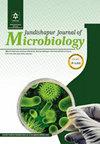LL-37和癌杆菌素II重组蛋白体外对金黄色葡萄球菌协同作用的评价
IF 0.5
4区 医学
Q4 MICROBIOLOGY
引用次数: 0
摘要
背景:由于抗菌药物耐药性的广泛发展,金黄色葡萄球菌感染的治疗已成为公共卫生危机。抗菌肽(AMPs)作为一种很有前途的天然来源的抗菌抗生素替代品被引入。LL-37和oncorhyncin II是2种AMPs,具有显著的抗菌作用。目的:制备重组LL-37和癌霉素II,并研究其对金黄色葡萄球菌(ATCC25923)的协同作用。方法:将合成的LL-37和癌蛋白II基因分别连接到pET32a表达载体上。将转化后的pET32a导入大肠杆菌BL21作为表达宿主。优化蛋白的表达和纯化步骤,并通过对金黄色葡萄球菌的最小抑制浓度(MIC)、时间杀伤和生长动力学试验来评价肽的生物学有效性。结果:MIC试验证实了LL-37和oncorhyncin II对金黄色葡萄球菌的抑菌效果,抑菌浓度分别为30.6和47.93µg/mL。通过棋盘法验证了多肽的协同活性。在2 × MIC下,LL-37和oncorhyncin II联合使用后,前5小时内活细胞数量急剧下降,减少了3倍以上,为log 10集落形成单位(CFU)/mL。生长动力学结果证实了多肽组合在暴露第一个小时内消除细菌接种浊度50%的高效率。结论:制备的重组LL-37和癌杆菌素具有较好的抗菌作用。通过棋盘图、时间杀伤和生长动力学试验反复证实了肽的协同性能。本文章由计算机程序翻译,如有差异,请以英文原文为准。
Evaluation of the Synergistic Effect of LL-37 and Oncorhyncin II Recombinant Proteins on Staphylococcus aureus Under In Vitro Conditions
Background: The treatment of Staphylococcus aureus infections has become a public health crisis due to the extensive development of antimicrobial resistance. Antimicrobial peptides (AMPs) have been introduced as promising naturally-derived antimicrobial alternatives to antibiotics. LL-37 and oncorhyncin II are 2 AMPs with notable proven antibacterial effects. Objectives: This study aimed to produce recombinant LL-37 and oncorhyncin II and investigate their synergistic effects on S. aureus (ATCC25923). Methods: The synthetic genes of LL-37 and oncorhyncin II were individually ligated into the pET32a expression vector. Transformed pET32a was introduced into Escherichia coli BL21 as an expression host. The protein expression and purification steps were optimized, and the biological effectiveness of the peptides was evaluated by assessing the minimum inhibitory concentration (MIC), time-kill, and growth kinetic tests against S. aureus. Results: The MIC assay confirmed the effective antibacterial performances of LL-37 and oncorhyncin II against S. aureus at 30.6 and 47.93 µg/mL, respectively. The peptides’ synergistic activity was validated by the checkerboard method. A combination of LL-37 and oncorhyncin II at 2 × MIC showed a sharp decline of the viable cells with over 3-time reductions in log 10 colony-forming units (CFU)/mL within the first 5 hours. The growth kinetic results confirmed the high effectiveness of the peptides’ combination in eliminating the bacterial inoculum turbidity by 50% reduction during the first hour of exposure. Conclusions: The produced recombinant LL-37 and oncorhyncin II showed effective antimicrobial function against S. aureus. The synergistic performance of the peptides was repeatedly confirmed through checkerboard, time-kill, and growth kinetic assays.
求助全文
通过发布文献求助,成功后即可免费获取论文全文。
去求助
来源期刊

Jundishapur Journal of Microbiology
MICROBIOLOGY-
CiteScore
1.30
自引率
0.00%
发文量
56
审稿时长
6-12 weeks
期刊介绍:
Jundishapur Journal of Microbiology, (JJM) is the official scientific Monthly publication of Ahvaz Jundishapur University of Medical Sciences. JJM is dedicated to the publication of manuscripts on topics concerning all aspects of microbiology. The topics include medical, veterinary and environmental microbiology, molecular investigations and infectious diseases. Aspects of immunology and epidemiology of infectious diseases are also considered.
 求助内容:
求助内容: 应助结果提醒方式:
应助结果提醒方式:


